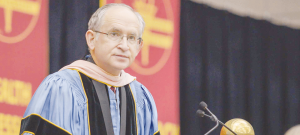
Many Ferris seniors are only weeks away from that point, and they’re full of mixed emotions.
“I’m mostly just sad because I’ve been here for the last four years and it’s going to be really sad to put it aside,” public relations senior Carman Plank said. “A lot of people compare it to graduating high school, but I think it’s ten times worse when you’re in the position I’m in and you’re involved in a lot.”
Throughout her time at Ferris, Plank has been involved in organizations such as student government and Zeta Tau Alpha, which she believes is one of the best things she’s taken away from the university.
“It brings you a lot of opportunities if you take the plunge and actually get involved in things,” said Plank. “I’m going to miss just being as busy as I am. I love being busy. One summer I just worked, and it was really weird because you work for eight hours, come home and make dinner, and that’s your life.”
We’ve all been told the benefits of “getting involved” in college, but a recent Ferris grad can attest to the true importance of doing something other than going to class.
“Being on so many different executive boards and working with student organizations was probably what prepared me most,” said Newlyn Wing, who graduated in summer 2014 from Ferris’ professional tennis management program and found a full-time job shortly after. “Internships also prepared me. There were so many classes I took where I wondered when I would ever use them, and I don’t.”
Even though students fork over tens of thousands of dollars to get an education, the financial help of a full-time position isn’t promised, which is pretty unnerving.
“I’m terrified,” public relations senior Calsie Penzien said. “It’s so scary. You submit the application, and it’s three, four weeks, maybe a month or more, and you don’t hear anything back. But you can’t be fit for every job, right? It’s just scary thinking that in six months, I’m going to have loan payments rolling through the doors.”
When she does find a job, Penzien anticipates having to adjust to a more set in stone schedule.
“The first thing that came to mind that I’m going to miss is the freedom,” Penzien said. “When you go into the real world, you’ve got your 9-5 job, where here I’ve got just a much more open schedule.”
Not only is the option of sleeping until noon and not starting the day until 3 p.m. gone, but Wing also explained how graduates are viewed in a different light after earning a diploma.
“It changes how you’re perceived big time,” said Wing. “Not that you change into somebody different, but you can’t pull off the ‘I’m just a student’ thing anymore. You’re taken a little more seriously because you’re not a college student anymore—you’re a college graduate.”
Even though she’s about to move on from being a bulldog, Penzien believes coming to Ferris was “probably the best decision” she ever made.
“I just really blossomed as a leader here and discovered myself,” said Penzien. “It’s homey here. I’m comfortable, it’s not too big, it’s not too small, and there are plenty of things to do.”
The last piece of advice from Wing to every college student: take advantage of those things to do, work hard, and make yourself somebody worth hiring.
“So many people go through Ferris and don’t do anything for four years, so what makes them valuable in that stack of resumes?” said Wing. “You have to do stuff that adds value to your résumé.”
